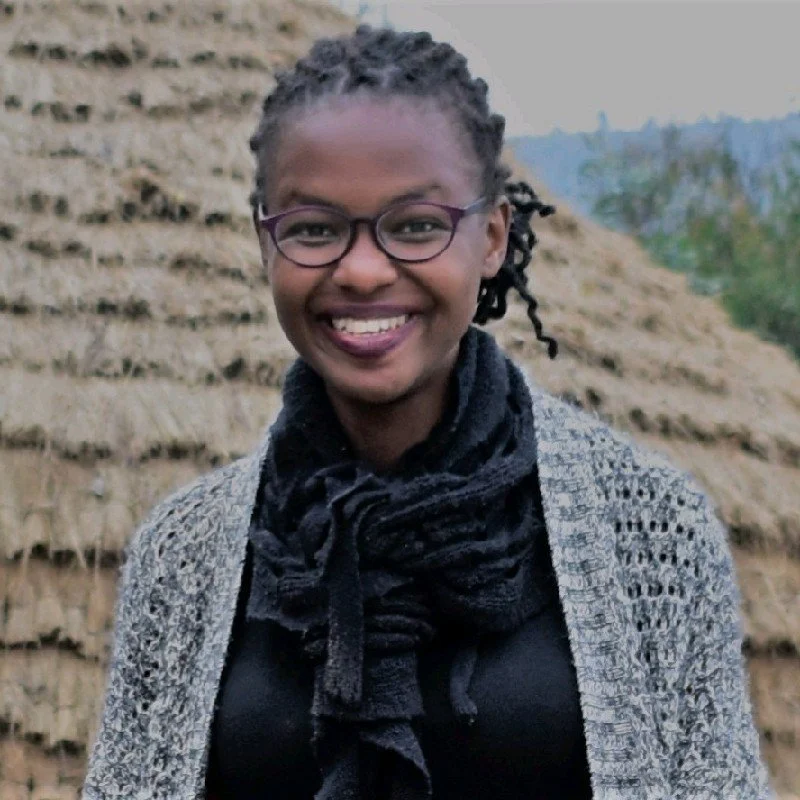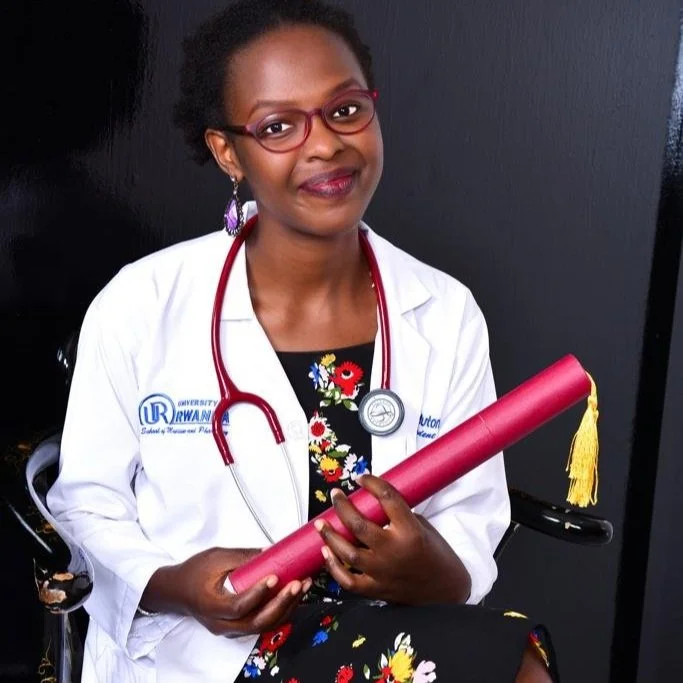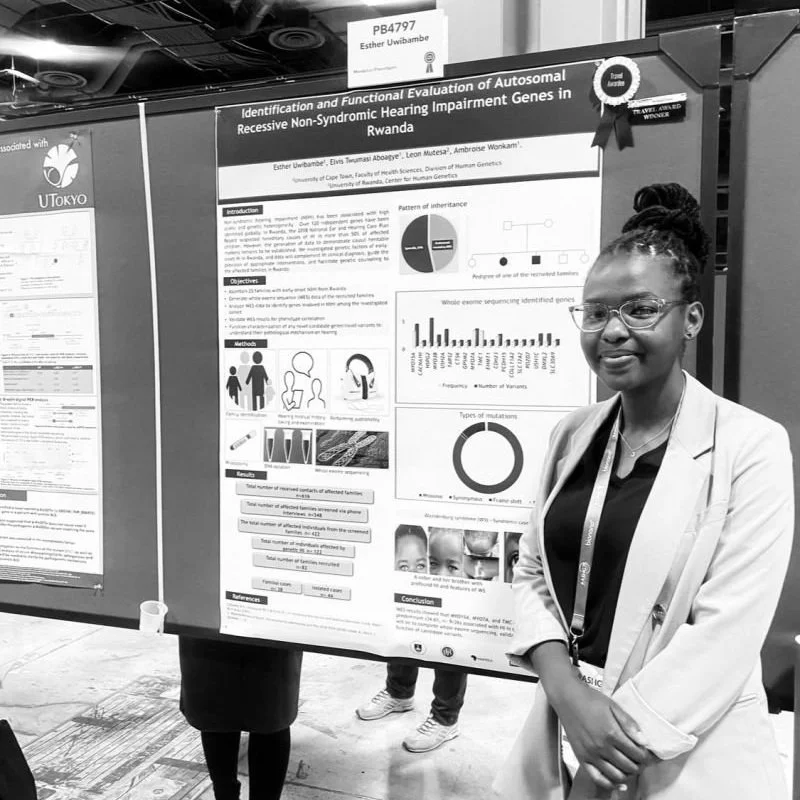Empowering Health Equity: A Journey from Gashora to Human Genetics
"Gashora has been a distinct foundation that inspired unlimited imagination, enabled me to dream big, and unfolded a vast horizon of possibilities. "
In this interview, we delve into the inspiring journey of Esther Uwibambe, a trailblazing alumna of Gashora Girls Academy. From her formative years at Gashora to her current pursuit of a Ph.D. in human genetics at the University of Cape Town, Esther's story epitomizes resilience, determination, and a relentless drive to advance healthcare equity.
Please introduce yourself.
My name is Esther Uwibambe; I am a GGAST alumna, class of 2013. After I graduated from Gashora Girls Academy, I attended the University of Rwanda, where I studied medicine and surgery and graduated with an MBBS degree in 2019. From there, I practiced medicine at different public hospitals in Rwanda's urban and rural communities. In 2022, I graduated from the University of Global Health Equity (UGHE) with a master's degree in global health delivery. In my free time, I enjoy reading poetic pieces and watching movies.
Can you elaborate on specific skills or mindsets instilled at Gashora Girls Academy that you found particularly valuable in navigating both academic and social aspects of college life?
Gashora has been a distinct foundation that inspired unlimited imagination, enabled me to dream big, and unfolded a vast horizon of possibilities. This foundation allowed me to successfully navigate different aspects of college life, from academics to social engagements, while always aiming high and defining strategies to meet my goals. GGAST provided extracurriculars that filled me with soft and hard skills that have always enabled me to critically assess situations and make the right informed decisions for me. Gashora empowered me with confidence and self-determination which has led me to view the world with optimism to work my way up to success.
Pursuing a Ph.D. in human genetics at the University of Cape Town is a significant step. What inspired this decision, and how do you envision leveraging your Ph.D. to contribute to advancements in healthcare, particularly in human genetics?
I decided to pursue a Ph.D. in human genetics because I wanted to acquire advanced knowledge and increase my chances of making a scalable impact. The degree is an opportunity to expand my network, fuel a design thinking capacity, and equip me with advanced skills to enhance my abilities for problem-solving. With my Ph.D., in five to ten years, I hope to be an independent researcher who contributes evidence-based knowledge to the healthcare system of Rwanda and collaborates in groundbreaking research.
“During the conference, I presented a poster on my current PhD work entitled "Identification and Functional Evaluation of Autosomal Recessive Non-Syndromic Hearing Impairment Genes in Rwanda."
Attending the American Society of Human Genetics annual conference must have been enlightening. Can you share more about your experience there?
Attending and participating in the American Society of Human Genetics annual conference was an excellent opportunity to experience an incredibly informative and transformative platform. I attended various plenary sessions with so many mind-blowing and inspiring panel discussions. I learned from experts about different advances in genetics and genomics. During the conference, I presented a poster on my current PhD work entitled "Identification and Functional Evaluation of Autosomal Recessive Non-Syndromic Hearing Impairment Genes in Rwanda." As a travel award winner, I was privileged to get invited to various events, including the "Meet the Expert" event. Here, I had a chance to engage in a round table discussion with an expert in my field of interest. I was thrilled because the discussion helped me better understand an important concept aligning with my career path.
Your involvement in various extracurricular activities at the University of Rwanda, is commendable. How have these experiences shaped your understanding of the intersection between healthcare and community needs, and how do you apply these insights in your current endeavors?
During my college years, I actively contributed to community health initiatives as a member of the Medical Students' Association of Rwanda (MEDSAR). Specifically, I served on the Standing Committee on Public Health (SCOPH), organizing and executing numerous campaigns to raise awareness about disease prevention through channels like radio talks and community education. Additionally, I played key roles in organizing the association's annual conferences and participated in the World Healthcare Students Symposium (WHSS) 2018 held in Rwanda. Through the Young African Leadership Initiative (YALI) program, I received training in civic leadership, empowering me to drive positive transformation in my community.
These extracurricular engagements deepened my understanding of healthcare disparities across different communities, emphasizing the significance of community-centered healthcare systems. By immersing myself in various communities, I learned firsthand about their unique social determinants of health—the conditions shaping their health outcomes and quality of life. Recognizing the importance of research in addressing these disparities, I am committed to making meaningful contributions in researching diverse health-related areas to foster more equitable healthcare systems.
“By immersing myself in various communities, I learned firsthand about their unique social determinants of health—the conditions shaping their health outcomes and quality of life. Recognizing the importance of research in addressing these disparities, I am committed to making meaningful contributions in researching diverse health-related areas to foster more equitable healthcare systems.”




